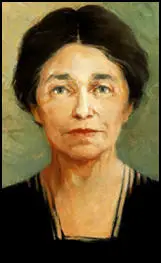Hattie Caraway

Hattie Wyatt was born in Bakerville, Tennessee on 1st February, 1878. After graduating from Dickson College in 1896 and married fellow student, Thaddeus Caraway, and moved to Arkansas where her husband worked as a lawyer. In 1912 he was elected to Congress.
When her husband died on 6th November, 1931, the Governor of Arkansas, Harvey Parnell appointed Hattie Caraway as his replacement. She was confirmed in a special election on 12th January, 1932, and therefore became the first woman to win a place in the Senate.
In May 1932, Hattie Caraway announced she was a candidate for re-election to a full term. Joseph T. Robinson and other leaders of the Democratic Party in Arkansas were opposed to the idea and told her she would not win the party nomination. Caraway approached Huey Long and he agreed to help her in her campaign. The American Federation of Labor also supported her and she defeated her nearest competitor by two to one.
On her return to the Senate she became a loyal advocate of Huey Long's Share Our Wealth campaign. Caraway also supported President Franklin D. Roosevelt and his New Deal. In the Senate she served as chairwoman of the Committee on Enrolled Bills.
In 1944 Caraway was defeated by William Fulbright. The following year she was invited to join the United States Employees' Compensation Commission (1945-46) and the Employees' Compensation Appeals Board (1946-1950). Hattie Caraway died at Falls Church, Vermont, on 21st December, 1950.
Primary Sources
(1) Huey Long, speech in support of Hattie Caraway (October, 1932)
It is nip and tuck with us, up there in the Senate. If Wall Street and their trust gang succeed in defeating enough senators who have stood with the people like this little woman senator from Arkansas has, they'll have the whip hand on you. You'll never be able to get anyone from this state to stand by you again.
(2) Hermann Deutsch, Saturday Evening Post (15th October, 1932)
Farmers drove to town in their own automobiles - and no few of the cars were this year's models - in such numbers that highways were congested in every direction. Fifteen minutes after he began to talk, Huey Long would have these same farmers convinced that they were starving and would have to boil their old boots and discarded tires to have something to feed the babies till the Red Cross brought around a sack of meal and a bushel of sweet potatoes to tide them over; that Wall Street's control of the leaders - not the rank and file - of both Democratic and Republican parties was directly responsible for this awful condition; that the only road to salvation lay in the reelection of Hattie W. Caraway to the Senate.
(3) Raymond Gram Swing, The Nation (January, 1935)
Huey Long is the best stump speaker in America. He is the best political radio speaker, better even than President Roosevelt. Give him time on the air and let him have a week to campaign in each state, and he can sweep the country. He is one of the most persuasive men living." This is the opinion not of a Long supporter, but of one of the key men in the fight against the Kingfish in Louisiana. The North, he said, is misled into dismissing him as a clown, and has no conception of Huey's talents and of his almost invincible mass appeal. Mrs. Hattie Caraway of Arkansas can testify to his powers, for when she entered the primary asking to succeed her late husband in the United States Senate, she was generally expected to run last among five candidates and to poll not more than 2, 000 votes. The four men against her were experienced and able. But Huey took his sound van into Arkansas for one week, and though he could not get into every county, he made a circular tour during which he spoke six times a day. Instead of 2,000 votes Mrs. Caraway won a majority over the combined opposition in the first primary, tantamount to election in a Democratic state. An analysis of the vote showed that the districts where Huey did not appear virtually ignored her, while those which he toured gave her a landslide.
